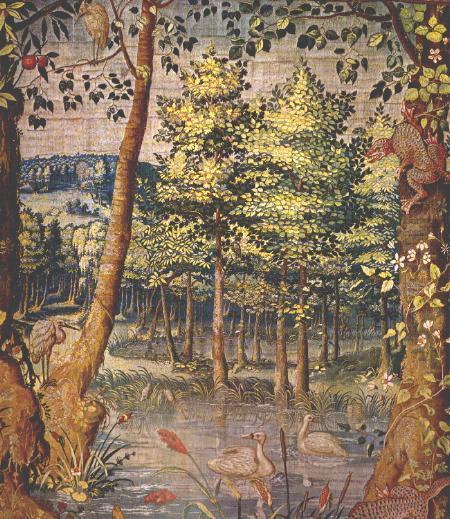Sonnet XIX
Devouring Time, blunt
thou the lion's paws,
And make the earth devour her own sweet brood;
Pluck the keen teeth from the fierce tiger's jaws,
And burn the long-lived phoenix in her blood;
Make glad and sorry seasons as thou fleet'st,
And do whate'er thou wilt, swift-footed Time,
To the wide world and all her fading sweets;
But I forbid thee one most heinous crime:
O! carve not with thy hours my love's fair brow,
Nor draw no lines there with thine antique pen;
Him in thy course untainted do allow
For beauty's pattern to succeeding men.
Yet, do thy worst old Time: despite thy wrong,
My love shall in my verse ever live young.
Again the poet declares the prospect of immortality for the youth through his verse. Not only will he live forever, but he will be eternally young, and the ravages of time will not touch him. Time will instead do the conventional damage which is customary and known to all, killing sweetness and beauty everywhere. And, despite a temporary prohibition, which the poet then abandons, time will proceed on its usual course, and even do its worst against the youth, the poet's love. Yet despite this the youth will survive in the verses made to celebrate his beauty and the poet's love for him.
The two declarations of love are important, because some commentators claim that sonnet 20 marks a change of direction in the poet's attitude to the young man. In fact the change has already occurred, in 10, 13, and 15 before it is repeated here.
Make thee another self, for love of me, 10
O, none but unthrifts! Dear my love, you know
You had a father: let your son say so. 13
And all in war with Time for love of you,
As he takes from you, I engraft you new. 15
The 1609 Quarto Version

DEuouring time blunt thou the Lyons pawes,
And make the earth deuoure her owne ſweet brood,
Plucke the keene teeth from the fierce Tygers yawes,
And burne the long liu'd Phœnix in her blood,
Make glad and ſorry ſeaſons as thou fleet'ſt,
And do what ere thou wilt ſwift-footed time
To the wide world and all her fading ſweets:
But I forbid thee one moſt hainous crime,
O carue not with thy howers my loues faire brow,
Nor draw noe lines there with thine antique pen,
Him in thy courſe vntainted doe allow,
For beauties patterne to ſucceding men.
Yet doe thy worſt ould Time diſpight thy wrong,
My loue ſhall in my verſe euer liue young.
Commentary
- 1. Devouring Time, blunt thou the lion's paws,
- 'Time devours all things' is a recorded proverb of the age. Here Time is shown destroying the fiercest as well as the mildest things.
- 2. And make the earth devour her own sweet brood;
- The earth devours her own children in the sense that they all return to the dust and ashes of which they were made. In Greek mythology, Saturn, the old earth God, was supposed to have eaten all of his children as soon as they were born. (See the painting by Goya).
- 3. Pluck the keen teeth from the fierce tiger's jaws,
- Rotten teeth were a sign of age. Even the tiger, almost a fabulous animal in Shakespeare's time, was subject to decay. His fierceness was abated by the passage of time.
- 4. And burn the long-lived phoenix in her blood;
- The phoenix was a bird of legend, said to live for 500 years, at the end of which time it burnt itself on its own funeral pyre, from the ashes of which it would subsequently arise. It was thus a symbol of immortality.
- 5. Make glad and sorry seasons as thou fleet'st,
Winter was a gloomy and miserable season. Spring and summer were happy, autumn also, but with a hint of the coming end, and of slightly ambiguous beauty. The adjective sorry is mostly used in Shakespeare in the phrase 'to be sorry'. The concordance lists it in 93 occurrences, but only in four other instances is it found in its purely adjectival use, as here.
Thither go these news, as fast as horse can carry them:
A sorry breakfast for my Lord Protector. 2H6.I.4.75-6......the Duke himself in person
Comes this way to the melancholy vale,
The place of death and sorry execution,
Behind the ditches of the abbey here. CE.V.1.119-122The meaning is evidently 'gloomy, such as would cause misery and sorrow'.
as thou fleet'st = as you swiftly pass by. OED 10c gives 'Of time: To pass rapidly and imperceptibly; to slip away'.- 6. And do whate'er thou wilt, swift-footed Time,
- The poet no longer thinks he can hold back Time, and therefore rhetorically allows him (it) to do whatever he wishes.
- 7. To the wide world and all her fading sweets;
- her fading sweets = beautiful things of the world which are doomed to fade and die.
- 8. But I forbid thee one most heinous crime:
- One most heinous crime - the crime described in the following two lines.
- 9. O! carve not with thy hours my love's fair brow,
- Note the open declaration of my love's fair brow, echoed in the final line My love shall in my verse etc. The youth is now unambiguously addressed as my love. The furrows, (lines and wrinkles, as in a ploughed field), made by time in love's fair brow, are symbolic of the ageing process.
- 10. Nor draw no lines there with thine antique pen;
- The use of draw here and carve in the line above almost imply that Time is a sculptor or artist. Perhaps this is a suggestion of duplicity on the part of Time - the only results of Time's artistry are death and destruction. antique pen - all of times artefacts, sickle, scythe, hourglass, clothing, could be described as antique, since they are as old as time itself. But the pen here, as well as being antique, also has the effect of making people antique. The word antique was indistinguishable from antic at the time, so it had the residual meaning of 'insane', hence the suggestion here could also be that Time's antique pen is furiously and insanely destructive. (See OED 'antique'- etym.).
- 11. Him in thy course untainted do allow
- As you (Time) pass by on your course of destruction, leave him, the lovely youth, untouched and unharmed...
- 12. For beauty's pattern to succeeding men.
- So
that he remains as a template (pattern)
from which future generations may know how beauty was constructed. The
idea
of a pattern or form or ideal by which material bodies were derived is
Neo-Platonic.
succeeding men = people of future generations. to succeed is 'to follow on from'. - 13. Yet, do thy worst old Time: despite thy wrong,
- An abandonment of the prohibition made above. Time cannot be stopped, whatever we do. Therefore to succumb is the only remedy. Immortality may be sought in other ways.
- 14. My love shall in my verse ever live young.
Immortal youth can be achieved for my love (the young man) through my verse. My love could also refer to 'my love for him', which would remain therefore forever fresh and green. This latter meaning is perhaps the predominant one, since the youth's eventual decay is underscored by the description of time's swift foot in this and other sonnets.
Spring, from a 16th. Century tapestry.
